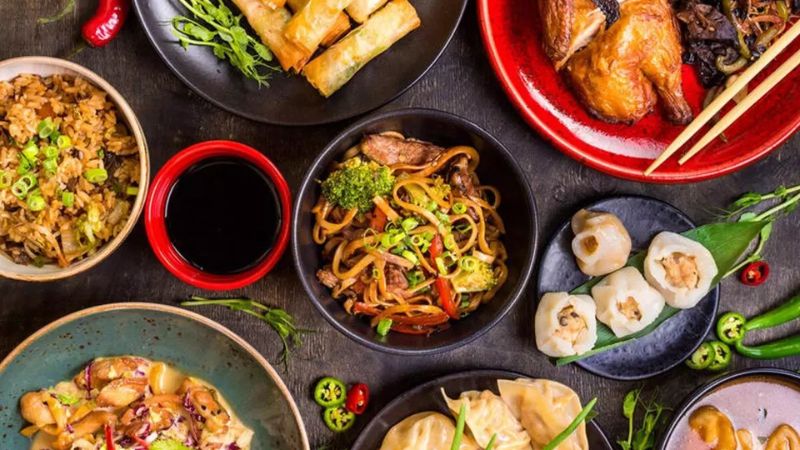
Why is Chinese food famous?
A Culinary History Rooted in Tradition
Chinese cuisine is one of the oldest in the world, with a history spanning thousands of years. From the early dynasties to modern times, food has been an integral part of Chinese culture. Each dynasty contributed to the development of different dishes and cooking methods, creating a diverse and complex culinary tradition. The New China restaurant, a modern-day embodiment of traditional Chinese culinary techniques, often incorporates recipes and cooking styles that date back centuries, highlighting the deep historical connection between food and Chinese culture.
Regional Variations: More Than Just One Cuisine
One of the main reasons Chinese food is so famous is its immense variety. China is a vast country with distinct regions, each offering its own take on flavor, ingredients, and cooking methods. Broadly speaking, Chinese cuisine is divided into eight major culinary traditions, including:
- Sichuan: Known for its bold, spicy flavors and liberal use of chili and garlic.
- Cantonese: Famous for its delicate, mild dishes, often highlighting seafood.
- Shandong: Featuring hearty, rich flavors with an emphasis on seafood and grains.
- Jiangsu: Celebrated for its refined cooking techniques and emphasis on presentation.
At a New China restaurant, you’ll likely encounter a mix of these regional styles, allowing diners to experience a wide array of tastes in a single meal. This diversity within the cuisine has helped Chinese food maintain its relevance and appeal across different cultures and generations.

Key Elements That Make Chinese Food Unique
Balance is a critical concept in Chinese cooking, both in terms of flavors and ingredients. Chinese food often aims to create harmony between the five fundamental tastes: salty, sweet, sour, bitter, and umami. Achieving this balance ensures that no single flavor overwhelms the palate, making the food more enjoyable and digestible. Dishes like sweet and sour pork, for instance, combine opposing flavors to create something that feels satisfying and complete.
Another essential aspect is the use of fresh ingredients. In traditional Chinese cooking, the quality and freshness of ingredients are paramount. Many dishes are centered around seasonal produce and locally sourced ingredients, ensuring that the food is not only delicious but also nutritious.
The Art of Preparation: Techniques That Stand Out
Chinese cuisine is known for its diverse cooking techniques, some of which have been passed down through generations. Methods like stir-frying, steaming, and braising allow for a wide range of textures and flavors, creating dishes that can be both comforting and complex. Stir-frying, for example, is a technique that preserves the freshness of the ingredients while ensuring a crispy exterior and tender interior. On the other hand, steaming is a healthier cooking method that retains nutrients and flavors, often used for dishes like dumplings and fish.
At New China restaurant, chefs are skilled in these traditional techniques, blending them with modern approaches to create dishes that resonate with contemporary diners while still paying homage to the past.
The Cultural Significance of Chinese Food
Beyond its taste, Chinese food holds deep cultural importance. Meals in Chinese culture are often seen as a way to bring people together, whether it’s for family gatherings, festivals, or business meetings. The act of sharing food, particularly in a communal setting, is a reflection of Chinese values of unity and harmony.
Dishes like Peking duck or dim sum are not just food items but cultural symbols that represent different aspects of Chinese history and tradition. In New China restaurant, these dishes are prepared with reverence to their cultural roots, offering diners more than just a meal but a window into the heritage of one of the world’s most ancient civilizations.

Global Influence: How Chinese Food Became a Worldwide Sensation
While Chinese food has long been popular in China, its rise to global fame began in the 19th century, during the waves of Chinese immigration to countries like the United States, Canada, and Australia. Chinese immigrants brought their culinary traditions with them, adapting their recipes to local tastes and ingredients, which helped Chinese food gain a foothold in these new regions.
Today, Chinese food is one of the most popular international cuisines, with Chinese restaurants found in virtually every city in the world. From casual takeout joints to high-end establishments like New China restaurant, the cuisine’s appeal transcends cultural boundaries. The adaptability of Chinese dishes—whether it’s the spiciness of Sichuan food or the mild flavors of Cantonese cuisine—allows them to be tailored to different palates, making Chinese food a global favorite.
The Role of Chinese Food in Health and Wellness
Another reason Chinese food is famous is its focus on health and wellness. Traditional Chinese medicine often incorporates food as a way to balance the body’s energies, known as yin and yang. For example, foods considered "cooling" are believed to counteract "hot" conditions in the body, promoting balance and overall well-being.
Many traditional Chinese dishes are designed with this philosophy in mind. Soups, for instance, are often prepared with herbs and ingredients thought to promote health, while stir-fries focus on using minimal oil and fresh vegetables to create nutritious meals. This health-conscious approach has helped Chinese food maintain its appeal, particularly as more people around the world seek out healthier dining options.
Conclusion
Chinese food has earned its place as one of the most beloved cuisines worldwide. Its depth of flavor, cultural significance, and adaptability have helped it transcend borders and become a global culinary treasure. Whether you’re dining at a New China restaurant or cooking a meal at home, Chinese food offers something for everyone—delicious, satisfying, and steeped in tradition.

